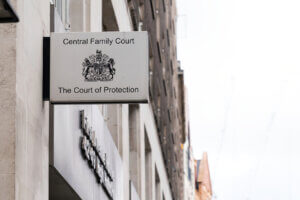What is Financial Disclosure in Divorce?

Contact
Table of Contents
Introduction to divorce financial disclosure
A divorce ends your marriage but it doesn’t end your financial ties to your former spouse.
During the divorce process it is hugely important to also engage in the process of resolving your financial arrangements. Important points to consider are where you will each live, if you have children, who they are going to live with and where, what you will live on and how you will share any assets. This includes any property, savings, investments, shares, business assets, personal belongings and pensions that you each own and deciding whether there should be ongoing maintenance payments.
Even if you do not intend to go to Court or instruct solicitors to help from start to finish, it is important to understand what a Court might order in your circumstances, to consider what would be fair. Taking legal advice early on in the process will help you get a sense of where you stand, what to prioritise and your next steps.
What is the purpose of financial disclosure in divorce?
After taking legal advice, financial disclosure is the first step. This is a process where you both provide information to the other regarding your income, assets and debts. The purpose of financial disclosure is to ensure that you both have a clear understanding of each other’s finances so you can negotiate a fair agreement on how to divide your assets and address any ongoing financial responsibilities.
If you both agree to engage in a “non-court” dispute resolution process such as mediation, arbitration or a private hearing, financial disclosure is required. Most couples therefore exchange disclosure on a voluntary basis, but a court can make orders for financial disclosure if necessary.
Even if you come to an agreement yourselves, the Court will, in the very least, need a summary of the financial position when determining whether the agreement is fair.
Form E for divorce and financial disclosure
In divorce proceedings, Form E is a vital financial disclosure document that both parties must complete. This comprehensive financial disclosure form requires detailed information about each party’s financial status to ensure transparency and fairness in the divorce settlement.
Here’s what you’ll need to disclose in a financial disclosure Form E:
- Property values
- Mortgage balances
- Each bank account you have and their balances
- Savings and investments, including shareholdings and any assets held in trust
- Endowment policies
- Personal belongings of value
- Debts and liabilities including tax
- The value of business assets
- Pension values
- All sources of income
- A budget of your typical monthly expenditure and future expenditure
Supporting documentation, such as bank statements, payslips, tax returns, mortgage statements and property valuations, must be provided to verify the financial details disclosed.
Form E can take some time to pull together as you may need to get independent valuations on property, businesses or pension plans.
Once Form E has been completed, it is exchanged with the other party. You both have an opportunity to examine the forms and documents, ask questions, and request further information or documentation if needed.
Once the form is exchanged, What happens after financial disclosure?
Once you are both satisfied with each other’s financial disclosure, discussions can begin on a fair financial settlement.
There are various settings in which this discussion can be had, as listed above. Your solicitor can consider with you which one is likely to be most appropriate in your circumstances.
When a financial agreement is reached, your solicitor will formalise it into a Consent Order. This must be sent to the Court to review and approve. The Court will only do so if they believe it is fair.
Once the Consent Order is approved by the Court, it becomes a legally binding document and only then are your financial claims against each other dismissed.
If you are unable to come to an agreement on your own, either through direct negotiation or in another non-court forum, then a court may need to make the decision for you. The judge will consider all relevant factors, including the financial disclosure in Forms E before determining what the terms of the financial settlement order should be.
What if I think my ex-spouse lied on their Form E?
The purpose of making financial disclosure in divorce is to ensure there is transparency as to what the full financial resources available to both of you are. For this reason, the Form E contains a ‘Statement of Truth.’, which you would both need to sign to confirm that the information given is a full, frank, clear and accurate disclosure of your financial and other relevant circumstances
The court also has the power to fine or even imprison individuals for providing false information or if one party refuses to cooperate with the financial disclosure process. For example, in the high-profile divorce of Scot and Michelle Young, Mr Young, a billionaire property tycoon, was sentenced to 6 months imprisonment for persistently refusing to honestly disclose his financial details.
If you believe your ex-spouse is hiding assets, it’s important to speak with your solicitor. There may be steps they can take to stop your ex from moving money around during the divorce process for example.
If you have a financial order and it is later proven in court that your ex lied on their Form E, or failed to disclose all their assets and the order as made is obviously significantly unfair to you, you may be able to ask the Court to set aside the order and reconsider what the order should be. In that case, your ex may be ordered to pay your costs.
Can I refuse financial disclosure?
Refusing disclosure may result in proceeding with a divorce without a financial order, but this is not advisable as it leaves future financial claims unresolved. While it is technically possible to refuse to voluntarily disclose details of your financial assets, the court can order you to provide the information anyway. If you ignore the court order, you can be fined or face tougher penalties.
If either spouse refuses financial disclosure it is likely to prolong divorce proceedings which will increase legal costs of both parties and the court may assume that by refusing to comply you are likely to be hiding assets. This could lead to an unfavourable settlement for the party that refuses.
What should I do if my spouse refuses financial disclosure?
If you have concerns about your spouse’s financial disclosure, speak with one of our specialist family lawyers. We can provide advice on how to handle your situation and ensure that your interests are protected.
To speak with one of our solicitors, contact us by:
- Filling in our online enquiry form; or
- Calling us on 020 7485 8811
Share this article
Contact us about Financial Disclosure in Divorce
Call us 020 7485 8811
Email us Send us an email and we’ll get back to you
Related to Financial Disclosure and DivorceVIEW ALL
- 4.7.2025
Standish Ruling: What Counts as Matrimonial Property
Supreme Court confirms only a valuable asset treated by parties as a matrimonial asset has been ‘matrimonialised’ The financial remedies...
Read more - 17.3.2025
Selling a House in Divorce
A guide to amicably selling a house during divorce One of the biggest issues in divorce is what happens to...
Read more - 24.2.2025
How Are Finances Divided On Divorce?
Avoiding Misconceptions: How Are Finances Divided On Divorce? The financial remedies team at Osbornes Law advises divorcing clients across London...
Read more - 21.2.2025
Protecting Business Privacy in Divorce Financial Proceedings
Business owners: protecting privacy of confidential information in financial proceedings on divorce We represent many business-owners in financial proceedings on...
Read more - 4.11.2024
Anglo-French Divorce: Jurisdiction Guide
Anglo-French Divorce: which jurisdiction is right for you? It has been a year since we launched our Anglo-French department in...
Read more - 29.10.2024
Economic Disadvantage in Divorce: Can You Be Compensated?
Giving Up High Earnings: Can A Party Be Compensated For Economic Disadvantage? In financial remedies cases, the fact that one...
Read more - 24.10.2024
Can a Declaration of Trust Stand in Matrimonial...
Matrimonial Homes: Can A Declaration Of Trust Of Beneficial Ownership Stand? Resolving issues relating to ownership of the former matrimonial...
Read more - 23.10.2024
When Abusive Behaviour Affects Divorce Financial Relief
When is Abusive Behaviour Relevant To Financial Relief on Divorce? Domestic violence and other abusive behaviours are a contributing factor...
Read more - 25.9.2024
What Happens to Savings & Investments in Divorce?
Divorce often raises important questions about the division of assets, particularly savings and investments. Understanding what happens to these financial...
Read more - 23.9.2024
International footballer fails to comply with financial disclosure
UD v TQ: The importance of complying with financial disclosure Recent divorce case involving an unnamed international footballer is a...
Read more - 20.9.2024
Pension Attachment Order: A guide
Pensions are quite often valuable assets in a marriage. In some cases, they can be worth more than the family...
Read more - 27.8.2024
Pension Sharing Orders
Pension Sharing in Divorce With so many things to consider when dividing up your finances during a divorce or dissolution...
Read more - 20.8.2024
What is pension offsetting?
In this article, we will explore the concept of pension offsetting and how it can play a crucial role in...
Read more - 12.8.2024
NA v LA [2024] EWFC 113: Judge Orders Non-Court Dispute...
Financial Claims: Judges Can Order Parties To Attempt Non-Court Dispute Resolution As was expected, the court has been quick to...
Read more - 1.8.2024
Standish v Standish: Court of Appeal Decision on...
Court of Appeal reduces wife’s divorce award by £20million Dealing with financial matters on divorce can be complex. And...
Read more - 1.8.2024
Matrimonial vs Non-Matrimonial Assets
Matrimonial vs Non-Matrimonial Assets in Divorce During a divorce, people often make the mistake of assuming that everything they own...
Read more - 1.8.2024
What is a Periodical Payments Order?
Periodical Payments Orders in Divorce Throughout the process of a divorce or when unmarried couples with children split up, numerous...
Read more - 1.8.2024
What is a Lump Sum Order?
A lump sum order is a crucial element of divorce settlements that can significantly impact the financial future of both...
Read more - 25.7.2024
What is a Property Adjustment Order?
A property adjustment order is a key legal mechanism used during a divorce to fairly divide property and assets between...
Read more - 14.6.2024
What Happens If You Have a Joint Mortgage...
Understanding whether you can keep a joint mortgage after divorce is crucial, especially if both parties are still liable for...
Read more - 7.6.2024
What is a Clean Break Order?
In this article, we will explore the concept of a clean break order, examining its advantages and disadvantages. We will...
Read more - 6.6.2024
Court reduces Wife’s award by £20 million
The biggest “Divorce Cut” in legal history Court of Appeal judges have just made history by reducing the divorce award...
Read more - 28.5.2024
Short-term marriage divorce settlements
A Marriage is a Marriage — Even if it’s short and childless When deciding who gets what in a divorce,...
Read more - 13.5.2024
Impact of extended family wealth on divorce
Can the wealth of extended family affect your divorce outcomes? While there is no fundamental legal difference between a high-net-worth...
Read more


























